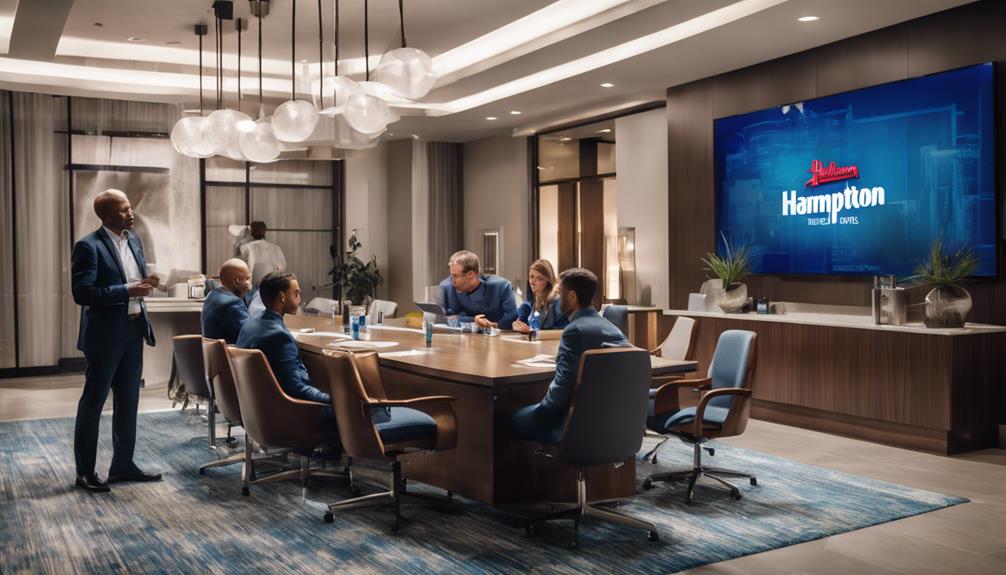Hampton by Hilton offers franchisees a unique opportunity for success through its strong brand reputation and broad support system. With a focus on customer satisfaction, the brand guarantees a consistent, high-quality experience that fosters guest loyalty. Franchisees benefit from thorough training programs and ongoing operational assistance, helping them navigate the hospitality landscape effectively. Financial requirements are clearly outlined, including an initial investment and ongoing fees, while exclusive territories reduce competition. By harnessing these advantages, franchisees can maximize their potential. Those interested can uncover further insights into what makes Hampton by Hilton a compelling choice for potential investors.
Key Elements

In exploring the key elements of Hampton by Hilton's success, one can look at its robust company and business overview.
This foundation not only supports franchisees but also outlines critical information for potential investors.
Understanding these components is essential for anyone considering a franchise opportunity in this thriving brand.
Company Overview
Hampton by Hilton stands out as a leading hotel brand, known for its commitment to guest satisfaction and strong franchise support.
With a focus on providing comfortable accommodations and a welcoming environment, the brand has built a reputation for quality.
Hampton by Hilton operates under the umbrella of Hilton Worldwide, benefiting from the global presence and resources of its parent company.
The brand emphasizes consistency, offering standardized services and amenities across its properties. This approach not only enhances the guest experience but also supports franchisees in maintaining operational excellence.
In addition, Hampton by Hilton's dedication to innovation guarantees that it stays relevant in a competitive market, making it a viable choice for potential franchise owners looking to invest in the hospitality industry.
Business Overview
The business model of Hampton by Hilton focuses on delivering high-quality accommodations while providing robust support to franchisees, ensuring a sustainable and profitable operation.
This approach includes all-encompassing training programs and ongoing operational assistance, designed to help franchisees navigate the hospitality landscape effectively.
The brand's strong reputation enhances customer loyalty and attracts guests, particularly during off-peak seasons.
Furthermore, franchisees benefit from exclusive territories, reducing competition within designated areas.
With a commitment to guest satisfaction, Hampton by Hilton's 100% satisfaction guarantee fosters a positive experience, driving repeat business.
Information for Franchisees
Franchisees benefit from extensive training and ongoing support, ensuring they've the tools needed for successful operations. Hampton by Hilton provides thorough training programs lasting several weeks at its headquarters in McLean, Virginia. This includes on-site consultations and continuous assistance through newsletters and promotional help.
Franchisees face an initial investment ranging from $12,834,733 to $24,076,967, with a franchise fee of approximately $100,000. Ongoing fees encompass advertising, royalty fees based on gross sales, and renewal fees, detailed in the Franchise Disclosure Document.
Exclusive territories may be granted, limiting competition in designated areas. Additionally, third-party financing options facilitate startup costs, making it easier for franchisees to thrive in their business endeavors.
Company Overview

Hampton by Hilton, founded in 1984, has established itself as a leader in customer-centric hospitality excellence.
With a seasoned executive team driving the brand, it leverages a competitive advantage to stand out in the crowded hospitality market.
This strong foundation supports its ongoing success and growth in the franchise sector.
Founding Year: 1984
Founded in 1984, Hampton by Hilton has established itself as a leading brand in the hospitality industry. The brand's commitment to quality and consistency has garnered a loyal customer base, setting a high standard for midscale hotels.
With its innovative approach, Hampton by Hilton focuses on providing travelers with comfortable accommodations and modern amenities. The brand has continually expanded its footprint, boasting thousands of locations worldwide.
Its strategic emphasis on customer satisfaction and operational excellence has fueled growth and recognition in a competitive market. By integrating cutting-edge technology and sustainable practices, Hampton by Hilton guarantees it meets the evolving needs of today's travelers while maintaining its reputation as a trusted choice in hospitality.
Customer-Centric Hospitality Excellence
Delivering exceptional service is at the heart of Hampton by Hilton's commitment to customer-centric hospitality excellence. The brand emphasizes understanding and anticipating guest needs, ensuring every stay is memorable.
With a focus on quality, Hampton by Hilton provides comfortable accommodations, complimentary amenities, and a welcoming atmosphere. Its dedicated staff undergoes extensive training to uphold high service standards, fostering genuine connections with guests.
The 100% satisfaction guarantee reinforces this commitment, empowering guests to voice their concerns and ensuring swift resolutions. By prioritizing customer feedback, Hampton by Hilton continuously adapts its offerings, enhancing the overall guest experience.
This unwavering dedication to hospitality excellence not only cultivates loyalty but also positions the brand as a leader in the competitive hotel industry.
Executive Team Experience
The executive team at Hilton brings a wealth of experience and industry knowledge, driving the brand's strategic vision and operational excellence in the hospitality sector. Their diverse backgrounds encompass marketing, finance, operations, and customer service, ensuring a holistic approach to hotel management.
This seasoned leadership fosters innovation and adaptability, allowing Hampton by Hilton to respond effectively to market trends and guest preferences. By prioritizing training and development, the team cultivates a culture of excellence that empowers franchisees and staff alike.
Their commitment to operational efficiency and guest satisfaction positions Hampton by Hilton as a leader in the hospitality industry, creating a solid foundation for growth and long-term success.
Competitive Advantage in Hospitality
Hampton by Hilton leverages its strong brand reputation and extensive support systems to create a competitive advantage in the hospitality industry. The brand's recognition fosters customer loyalty, making it easier to attract guests, especially during off-peak seasons.
Thorough training programs and ongoing support for franchisees guarantee operational success, allowing them to manage their businesses effectively. Exclusive territories further minimize competition, enhancing profitability potential.
Additionally, the 100% satisfaction guarantee elevates guest experience, encouraging repeat visits. By offering versatile spaces for business meetings, Hampton by Hilton generates extra revenue streams, appealing to both visitors and locals.
This strategic approach not only strengthens the brand but also positions it favorably in a competitive marketplace.
Brand Identity

Hampton by Hilton has established a strong national presence that resonates with travelers across the country.
Their commitment to customer-centric service, backed by a 100% satisfaction guarantee policy, sets them apart in the hospitality industry.
This focus on guest experience not only fosters loyalty but also reinforces their brand identity as a reliable choice for accommodations.
Strong National Presence
A strong national presence enables franchisees to leverage brand identity, attracting customers and enhancing loyalty across diverse markets.
Hampton by Hilton's recognizable branding plays a pivotal role in establishing trust and familiarity with potential guests. This visibility not only draws in travelers but also encourages repeat visits from satisfied customers.
The brand's commitment to quality service and value resonates with a wide audience, ensuring that franchises benefit from a consistent influx of clientele.
Additionally, the hotel's nationwide footprint allows franchisees to tap into various local markets, adapting offerings while maintaining brand standards.
This strategic advantage fosters a sense of community, making Hampton by Hilton a preferred choice for both leisure and business travelers.
Customer-Centric Service Commitment
Delivering exceptional customer service has become a hallmark of the brand's identity, ensuring guests feel valued and appreciated during their stay.
Hampton by Hilton emphasizes a customer-centric approach, training staff to prioritize guest needs and preferences. This commitment fosters genuine connections, enhancing the overall experience.
The brand encourages feedback, allowing for continuous improvement and adaptation to guests' expectations. By maintaining a welcoming atmosphere, Hampton by Hilton creates a sense of belonging, making guests more likely to return.
This focus on personalized service not only cultivates loyalty but also bolsters the hotel's reputation.
00% Satisfaction Guarantee Policy
Building on its commitment to exceptional customer service, the satisfaction guarantee policy reinforces Hampton by Hilton's brand identity by assuring guests of a quality experience during their stay.
This policy promises that if guests aren't satisfied with their accommodations, the hotel will make it right, either by refunding their money or providing a complimentary stay. Such assurance fosters trust and enhances customer loyalty, as guests feel valued and secure in their choice.
This proactive approach not only addresses potential issues but also sets Hampton by Hilton apart from competitors. By prioritizing guest satisfaction, the brand cultivates a positive reputation, driving repeat business and solidifying its position in the hospitality industry.
Information for Franchisees

Franchisees benefit from thorough training and ongoing support designed to guarantee their success within the Hampton by Hilton brand.
They undergo multiple weeks of extensive training at the headquarters in McLean, Virginia, ensuring they've the skills needed for operational excellence.
On-site consultations and continuous support, including newsletters and promotional assistance, are also part of the package.
Exclusive territories may be granted, minimizing competition in designated areas.
Additionally, options for absentee ownership allow for flexible management styles.
This robust framework empowers franchisees to navigate challenges effectively and build a thriving business.
With a focus on operational success and brand loyalty, Hampton by Hilton provides the essential tools for franchisees to flourish in the hospitality industry.
Financial Requirements & Ongoing Fees

When considering a Hampton by Hilton franchise, prospective owners need to understand the initial financial requirements and ongoing fees involved.
The franchise fee is around $100,000, with total initial investments reaching up to $24 million, depending on various factors.
Additionally, franchisees must account for ongoing royalties based on gross revenue and marketing contributions that support brand promotion.
Franchise Fee Around $100,000
The initial franchise fee for a Hampton by Hilton franchise is approximately $100,000, forming an important part of the overall financial requirements for prospective owners. This fee grants franchisees access to a well-established brand and thorough support systems that enhance operational success.
However, it's vital for potential franchisees to recognize that this fee is just one component of a larger financial commitment. Additional costs, including ongoing royalty fees, advertising contributions, and startup expenses, will also play a significant role in the franchise's financial landscape.
Understanding these financial obligations helps franchisees prepare better and strategize effectively for long-term success in the competitive hospitality market. Careful financial planning guarantees that owners can leverage the brand's reputation while managing their investments wisely.
100,000 Initial Franchise Investment
An initial investment for a Hampton by Hilton franchise typically ranges from approximately $12.8 million to $24 million, encompassing the franchise fee and various startup costs. This investment includes an initial franchise fee of around $100,000, which is just one component of the overall financial commitment.
Franchisees should also consider other expenses, such as construction, equipment, inventory, and marketing costs. Location plays a significant role in determining the total investment, as varying market conditions can affect pricing.
Additionally, potential franchisees need to prepare for ongoing fees, which include advertising and royalty payments. Thorough research and financial planning are essential for ensuring a successful venture within the Hampton by Hilton franchise system.
Percentage of Gross Revenue
Understanding the financial obligations of a Hampton by Hilton franchise also involves recognizing the ongoing fees, which include a percentage of gross revenue allocated for royalty payments.
Franchisees typically pay a royalty fee that directly correlates with their gross sales, ensuring that the brand continues to support and enhance its reputation. This arrangement allows franchisees to benefit from the established brand identity and operational systems while contributing to the collective strength of the brand.
The specific percentage is outlined in the Franchise Disclosure Document (FDD), and franchisees must factor this into their financial planning. Maintaining awareness of these ongoing fees is essential for effective budget management and long-term profitability in the competitive hospitality market.
Marketing Contribution Percentage
Franchisees typically contribute a percentage of their gross revenue toward marketing efforts, which helps maintain the brand's visibility and appeal in a competitive market.
This marketing contribution percentage is essential for funding national advertising campaigns, promotional initiatives, and brand-building activities that benefit all franchise locations. The specific percentage is outlined in the Franchise Disclosure Document (FDD), ensuring transparency for franchisees.
By participating in these collective marketing strategies, franchisees not only enhance their own business prospects but also contribute to the overall strength and recognition of the Hampton by Hilton brand.
This collaborative approach fosters a unified brand presence that draws customers and increases market share, ultimately leading to greater profitability for individual franchisees.
Maintenance and Repair Expenses
Maintenance and repair expenses are crucial ongoing costs that franchisees need to account for to keep their Hampton by Hilton properties in top condition.
These expenses include routine upkeep, unexpected repairs, and periodic renovations, all essential for maintaining brand standards and guest satisfaction.
Franchisees should budget for these costs as part of their operational expenses, ensuring they allocate sufficient funds to address wear and tear.
Additionally, regular maintenance helps avoid larger, more costly repairs down the line, preserving the property's value.
Staying proactive in managing these expenses contributes considerably to long-term success and profitability.
Ultimately, careful planning and adherence to maintenance guidelines can enhance the overall guest experience and protect the franchise's investment.
Financing Options

When considering a Hampton by Hilton franchise, various financing options are on the table.
Franchisees can tap into in-house financing, explore external funding sources, or even look into government-backed financing programs.
Each option presents unique advantages that can help franchisees manage their initial investment and ongoing costs effectively.
In-House Financing Options Available
What financing options are available for those looking to invest in a Hampton by Hilton franchise?
Hampton by Hilton provides several in-house financing options to support franchisees. These options typically cover franchise fees and initial startup costs, making it easier for potential investors to secure the necessary funds.
The brand's financing solutions often feature competitive interest rates and flexible repayment terms, enabling franchisees to manage their cash flow effectively. Additionally, franchisees can benefit from a streamlined application process, reducing the time it takes to access funds.
With these resources, Hampton by Hilton empowers franchisees to initiate their entrepreneurial journey with confidence, ensuring they've the financial backing necessary to launch and sustain a successful business.
External Funding Options Available
In addition to in-house financing, potential franchisees can explore a variety of external funding options to support their investment in a Hampton by Hilton franchise.
Traditional bank loans are a common choice, offering competitive interest rates for qualified applicants.
Franchisees can also consider private equity firms or venture capitalists, who may provide substantial funds in exchange for equity stakes.
Additionally, credit unions often offer favorable financing terms tailored for franchise businesses.
Peer-to-peer lending platforms have emerged as flexible alternatives, allowing franchisees to secure funds from individual investors.
These external funding avenues can ease the financial burden and help franchisees launch their operations successfully while maintaining their focus on growth and profitability.
Government-Backed Financing Options
Government-backed financing options provide franchisees with accessible funding solutions to support their investment in a Hampton by Hilton franchise. These programs often include loans backed by the Small Business Administration (SBA), which can offer lower interest rates and longer repayment terms compared to traditional financing.
By utilizing government resources, franchisees can secure the necessary capital for startup costs, including the franchise fee and initial operational expenses. Additionally, these financing options can help mitigate risks, making it easier for new owners to establish their businesses.
With supportive terms, government-backed financing enhances the feasibility of investing in a Hampton by Hilton franchise, allowing entrepreneurs to focus on building their brand and achieving long-term success.
Training & Support Offered

Hampton by Hilton provides franchisees with thorough onboarding workshops to guarantee they start on the right foot.
Continuous skill enhancement programs keep staff updated on best practices, while ongoing operational guidance sessions offer support as they navigate daily challenges.
This robust training and support framework greatly contributes to the success of each franchise location.
Comprehensive Onboarding Workshops
Franchisees benefit from extensive onboarding workshops that equip them with essential operational skills and knowledge for running a successful Hampton by Hilton location. These workshops, held at the franchise headquarters in McLean, Virginia, cover various topics, including customer service, revenue management, and brand standards.
Participants engage in hands-on training, enabling them to apply concepts in real-world scenarios. Additionally, franchisees learn about the brand's operational procedures and marketing strategies, ensuring consistency across locations.
The comprehensive nature of these workshops fosters confidence and preparedness, setting the stage for success. With ongoing support through resources like newsletters and consultations, franchisees feel empowered to navigate challenges and maximize their business potential effectively.
Continuous Skill Enhancement Programs
Ongoing training programs provide franchise owners with opportunities to continuously enhance their skills and adapt to the evolving hospitality landscape.
Hampton by Hilton emphasizes the importance of equipping franchisees with the latest industry knowledge and operational strategies.
These continuous skill enhancement programs include specialized workshops, online courses, and interactive seminars designed to address current challenges and trends in hospitality.
Franchise owners engage in hands-on training that covers everything from customer service excellence to advanced revenue management techniques.
Access to a wealth of resources, including updated training materials and expert-led sessions, guarantees that franchisees stay competitive and informed.
This commitment to ongoing support fosters a culture of learning, ultimately leading to improved guest experiences and heightened business success.
Ongoing Operational Guidance Sessions
Thorough operational guidance sessions equip franchise owners with essential tools and strategies to navigate daily challenges and enhance overall performance.
These sessions include extensive training programs lasting several weeks, held at the headquarters in McLean, Virginia. Franchisees receive on-site consultations that foster a deeper understanding of the brand's operational standards.
Ongoing support encompasses newsletters, regular meetings, and promotional assistance, ensuring franchisees stay updated on industry trends and best practices. Additionally, franchise owners benefit from a strong support network that assists in business management and growth.
LEGAL AND REGULATORY

When considering a Hampton by Hilton franchise, it's vital to understand the legal and regulatory landscape that governs operations.
Franchisees must review the Franchise Disclosure Document (FDD) carefully, as it outlines essential fees and obligations.
Additionally, compliance with local laws and regulations plays a significant role in ensuring a successful franchise venture.
Key Sections to Review
When considering a Hampton by Hilton franchise, it's essential to understand the legal obligations involved.
Franchisees must review key sections of the franchise agreement and the Franchise Disclosure Document (FDD) to guarantee compliance.
Familiarity with these legal aspects can greatly impact the franchise's success and operational efficiency.
Key Sections to Review
Franchisees must carefully review legal and regulatory sections of their agreement to confirm compliance and protect their investment.
These sections outline vital terms, conditions, and obligations that govern the franchise relationship.
Understanding the implications of local laws, licensing requirements, and operational guidelines is essential.
This diligence helps franchisees safeguard their interests and guarantees a smooth, successful business operation within the Hampton by Hilton framework.
Legal Obligations
Understanding legal obligations is essential for franchisees to secure compliance with their franchise agreement and protect their investment in the Hampton by Hilton brand.
Franchisees must carefully review sections related to operational standards, advertising requirements, and renewal terms.
Staying informed about local regulations and labor laws also helps minimize risks and guarantees smooth operations, contributing to overall franchise success and longevity.
MARKET ANALYSIS

Market analysis reveals that sustainable hospitality practices are becoming increasingly important to travelers, especially millennials.
This demographic tends to prioritize affordability alongside eco-friendly options when selecting accommodations.
Hampton by Hilton is well-positioned to attract this market segment by integrating sustainability into its offerings while maintaining competitive pricing.
Sustainable Hospitality Practices
The hospitality industry is witnessing a rising demand for eco-friendly hotels, with guests increasingly prioritizing sustainability in their travel choices.
Hampton by Hilton recognizes this trend and is adapting its practices to meet the growing need for environmentally conscious accommodations.
Rising Demand for Eco-Friendly Hotels
As travelers increasingly prioritize sustainability, eco-friendly hotels are experiencing a surge in demand, reflecting a shift in consumer preferences toward greener hospitality options.
This trend drives brands to adopt sustainable practices, such as energy-efficient systems and waste reduction initiatives.
Sustainable Hotel Demand Growth
Travelers increasingly seek out hotels that prioritize sustainability, driving a significant growth in demand for eco-friendly hospitality practices.
Hampton by Hilton recognizes this trend, implementing energy-efficient systems, reducing waste, and sourcing local products.
Millennial Travelers Seeking Affordability
Millennial travelers prioritize affordability without sacrificing quality, leading to a shift in the hospitality market.
They often seek budget-friendly options that still offer essential comforts and experiences.
Understanding their preferences and behaviors is vital for brands like Hampton by Hilton to attract this influential demographic.
Millennial Travel Preferences and Behaviors
Affordability drives younger generations to seek budget-friendly accommodations that offer value without compromising quality.
Millennial travelers prioritize experiences over luxury, focusing on essential amenities and convenient locations.
They favor brands that align with their values, including sustainability and social responsibility.
Additionally, digital connectivity and loyalty programs attract them, making Hampton by Hilton an appealing choice for budget-conscious, experience-driven millennials.
Millennial Travel Preferences Analysis
Budget-conscious young adults increasingly prioritize cost-effective accommodations that deliver essential amenities and convenient locations.
They seek value-driven options that enhance their travel experience without breaking the bank.
This demographic often favors hotels like Hampton by Hilton, which offer complimentary breakfast, Wi-Fi, and comfortable stays.
As they explore new destinations, affordability remains a key factor influencing their lodging decisions.
EXIT STRATEGY

As franchise owners consider their long-term plans, exploring transfer of ownership options becomes essential.
They can implement various ownership change strategies that align with their personal goals and market conditions.
Understanding these strategies helps guarantee a smooth exit while maximizing the franchise's value.
Transfer of Ownership Options
Considering the long-term nature of a Hampton by Hilton franchise agreement, planning for a transfer of ownership is essential for maximizing investment returns and ensuring a smooth changeover.
Franchisees often explore various options when considering exiting the business, including selling to a qualified buyer or transferring ownership to a family member.
It's vital to evaluate the financial implications and potential impacts on brand reputation. Franchise agreements typically stipulate conditions for transfers, so understanding these requirements helps avoid complications.
Franchisees should also consider timing, market conditions, and the franchise's performance to secure favorable terms.
Ownership Transition Strategies
Exploring ownership change strategies can greatly impact the long-term success and value of a Hampton by Hilton franchise. Franchise owners must consider various exit strategies to guarantee a smooth shift. Options include selling the franchise to another qualified investor or passing it on to family members. Each option requires careful planning and valuation to maximize returns.
Additionally, engaging a business broker can facilitate the sale process and attract potential buyers. It's essential for owners to maintain strong financial records and operational efficiency to enhance the franchise's marketability.
ADDITIONAL RESOURCES

In exploring additional resources for Hampton by Hilton franchisees, it's essential to address support questions, contact details, and networking opportunities.
These elements provide important assistance and connections that can enhance franchise operations.
Having access to the right information and networks empowers franchisees to thrive in a competitive market.
Franchisee Support Questions
Franchisees seeking additional resources for support can access a wealth of training programs, ongoing consultations, and promotional assistance tailored to guarantee their success.
Hampton by Hilton offers extensive training at their McLean, Virginia headquarters, assuring franchisees are well-equipped to manage their operations. On-site consultations and regular newsletters keep franchisees informed and engaged.
They also benefit from promotional assistance, helping to drive customer interest and loyalty. The franchise's commitment to ongoing support assures that franchisees can tackle challenges effectively, adapt to market changes, and sustain growth.
With exclusive territories often granted, franchisees can operate without fear of competition, further enhancing their chances for long-term success within the Hampton by Hilton brand.
Franchisee Support Contact Details
For franchisee support, Hampton by Hilton provides a dedicated contact team ready to assist with inquiries and resources needed for operational success. This team, comprised of experienced professionals, guarantees franchisees receive timely guidance on various aspects of their business operations.
Franchisees can reach out via phone or email for specific questions, whether they relate to training, marketing, or operational challenges. Additionally, thorough online resources, including manuals and FAQs, are available to address common concerns.
This proactive support structure fosters a collaborative environment, empowering franchisees to thrive in their ventures. With Hampton by Hilton's commitment to franchisee success, the contact team plays a crucial role in facilitating growth and operational excellence.
Franchisee Networking Opportunities
Connecting with fellow franchisees offers valuable networking opportunities that can enhance business strategies and foster growth within the Hampton by Hilton community.
By participating in regional meetings, conferences, and online forums, franchisees can share insights, discuss challenges, and exchange best practices. These interactions not only build relationships but also provide access to a wealth of knowledge that can lead to innovative solutions and improved operational efficiency.
Additionally, networking can open doors to collaborative marketing initiatives and partnerships, greatly boosting brand visibility. Engaging with a diverse group of franchisees helps create a supportive environment, ensuring that franchisees feel empowered and connected, ultimately driving the collective success of the Hampton by Hilton brand.
How Does Authority Marketing Contribute to the Success of Hampton by Hilton?
Hampton by Hilton’s success can be attributed to the implementation of the secrets of authority marketing. By positioning themselves as a trusted and knowledgeable source in the hospitality industry, they have gained credibility and influence. This has led to increased brand recognition, customer trust, and ultimately, business success.
Can the Strategies for Success in Business Brokerage be Applied to the Hospitality Industry?
The strategies for success in business brokerage can certainly be applied to the hospitality industry. By leveraging the same tactics for identifying, evaluating, and negotiating deals, hospitality professionals can focus on unlocking business brokerage opportunities to expand their ventures and enhance their bottom line.
Conclusion
In summary, Hampton by Hilton presents a compelling opportunity for aspiring franchise owners seeking a reputable brand and solid support system.
With a well-defined framework for success, financial transparency, and a focus on customer satisfaction, franchisees can confidently navigate the competitive hospitality landscape.
By leveraging the brand's resources and insights, they're positioned to achieve long-term growth and profitability, ultimately serving both local communities and travelers effectively.
This franchise truly reveals the potential for a thriving business.









